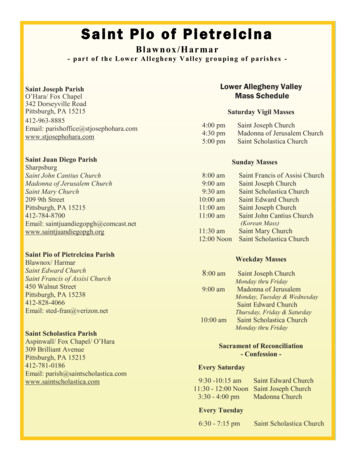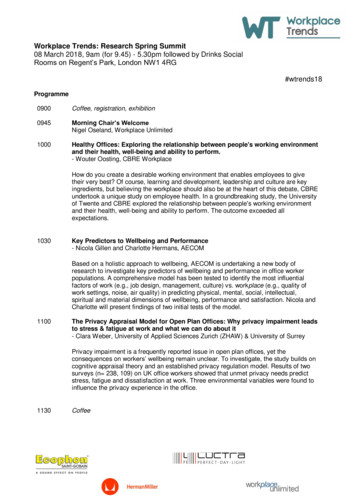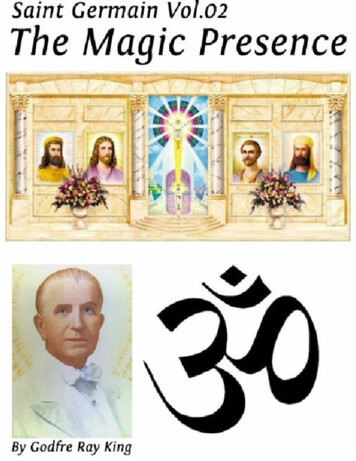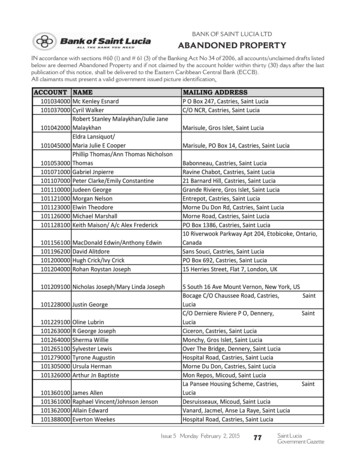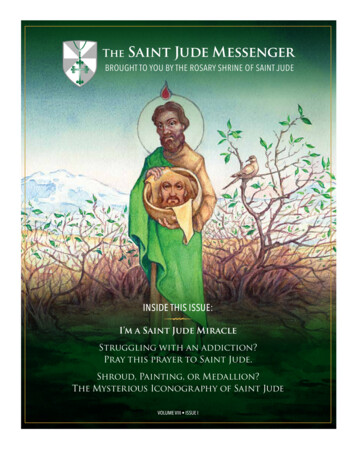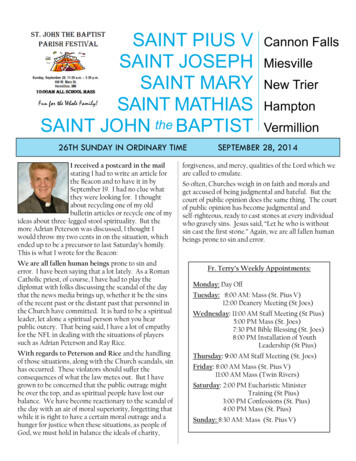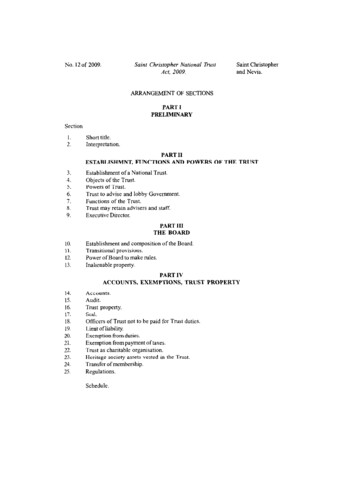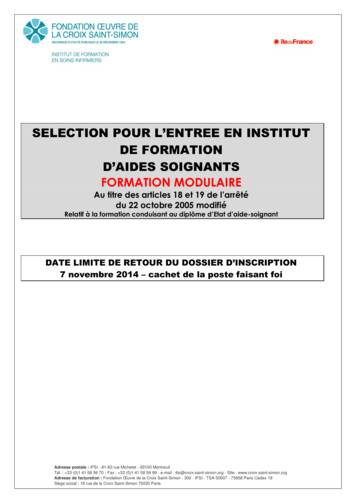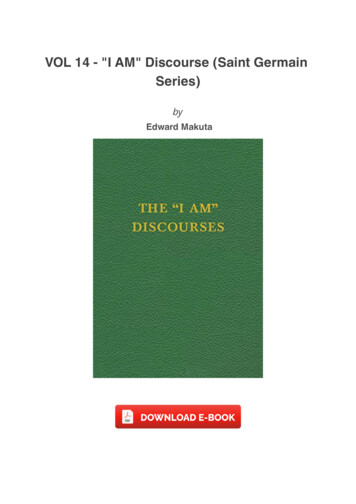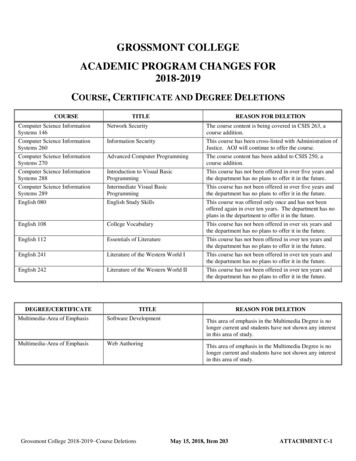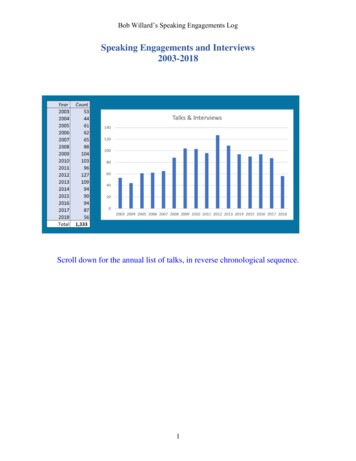
Transcription
start here. go anywhere.2018–2019Course Descriptions235 Marshall Avenue - Saint Paul, MN 55102 651.846.1600 saintpaul.edu
Course DescriptionsCourse descriptions are alphabetized by program area:Accounting . . . . . . . . . . . . . . . . . . . . . . . . . . . . . . . . . . . . 222Individualized Studies. . . . . . . . . . . . . . . . . . . . . . . . . . . . 258American Sign Language . . . . . . . . . . . . . . . . . . . . . . . . . 222Interpreter/Transliterator Sign Language. . . . . . . . . . . . . 258Anthropology . . . . . . . . . . . . . . . . . . . . . . . . . . . . . . . . . . 223Art. . . . . . . . . . . . . . . . . . . . . . . . . . . . . . . . . . . . . . . . . . . 223Massage Therapy . . . . . . . . . . . . . . . . . . . . . . . . . . . . . . . 259Automotive Service. . . . . . . . . . . . . . . . . . . . . . . . . . . . . . 225Mathematics. . . . . . . . . . . . . . . . . . . . . . . . . . . . . . . . . . . 260Medical Laboratory Technician. . . . . . . . . . . . . . . . . . . . . 261Biochemistry. . . . . . . . . . . . . . . . . . . . . . . . . . . . . . . . . . . 226Medical Office. . . . . . . . . . . . . . . . . . . . . . . . . . . . . . . . . . 263Biology . . . . . . . . . . . . . . . . . . . . . . . . . . . . . . . . . . . . . . . 226Music. . . . . . . . . . . . . . . . . . . . . . . . . . . . . . . . . . . . . . . . . 264Business. . . . . . . . . . . . . . . . . . . . . . . . . . . . . . . . . . . . . . . 228Business Technology. . . . . . . . . . . . . . . . . . . . . . . . . . . . . 229Nanoscience. . . . . . . . . . . . . . . . . . . . . . . . . . . . . . . . . . . 265Natural Sciences. . . . . . . . . . . . . . . . . . . . . . . . . . . . . . . . 266Cabinetmaking . . . . . . . . . . . . . . . . . . . . . . . . . . . . . . . . . 230Nursing Assistant/Home Health Aide. . . . . . . . . . . . . . . . 267Carpentry . . . . . . . . . . . . . . . . . . . . . . . . . . . . . . . . . . . . . 231Center for Manufacturing and Applied Engineering . . . . 232Pharmacy Technology. . . . . . . . . . . . . . . . . . . . . . . . . . . . 267Chemistry . . . . . . . . . . . . . . . . . . . . . . . . . . . . . . . . . . . . . 234Philosophy. . . . . . . . . . . . . . . . . . . . . . . . . . . . . . . . . . . . . 268Child Development. . . . . . . . . . . . . . . . . . . . . . . . . . . . . . 234Phlebotomy. . . . . . . . . . . . . . . . . . . . . . . . . . . . . . . . . . . . 269Chinese Language. . . . . . . . . . . . . . . . . . . . . . . . . . . . . . . 236Physics. . . . . . . . . . . . . . . . . . . . . . . . . . . . . . . . . . . . . . . . 269CNC Technology. . . . . . . . . . . . . . . . . . . . . . . . . . . . . . . . 236Pipefitting. . . . . . . . . . . . . . . . . . . . . . . . . . . . . . . . . . . . . 270College & Career Planning Success Strategies. . . . . . . . . 237Plumbing. . . . . . . . . . . . . . . . . . . . . . . . . . . . . . . . . . . . . . 272Communication. . . . . . . . . . . . . . . . . . . . . . . . . . . . . . . . . 237Political Science. . . . . . . . . . . . . . . . . . . . . . . . . . . . . . . . . 272Computer Science. . . . . . . . . . . . . . . . . . . . . . . . . . . . . . . 238Practical Nursing. . . . . . . . . . . . . . . . . . . . . . . . . . . . . . . . 273Cosmetology, Nail Care and Esthetician Core Courses. . 241Psychology . . . . . . . . . . . . . . . . . . . . . . . . . . . . . . . . . . . . 274Culinary Arts. . . . . . . . . . . . . . . . . . . . . . . . . . . . . . . . . . . 243Public Health. . . . . . . . . . . . . . . . . . . . . . . . . . . . . . . . . . . 274Culinary Arts - Wine . . . . . . . . . . . . . . . . . . . . . . . . . . . . . 245Reading. . . . . . . . . . . . . . . . . . . . . . . . . . . . . . . . . . . . . . . 275Digital Graphics and Interactive Multimedia . . . . . . . . . . 245Related Welding. . . . . . . . . . . . . . . . . . . . . . . . . . . . . . . . 275Respiratory Therapist . . . . . . . . . . . . . . . . . . . . . . . . . . . . 276Economics. . . . . . . . . . . . . . . . . . . . . . . . . . . . . . . . . . . . . 247Sheet Metal. . . . . . . . . . . . . . . . . . . . . . . . . . . . . . . . . . . . 277Electrical Technology . . . . . . . . . . . . . . . . . . . . . . . . . . . . 247Sociology. . . . . . . . . . . . . . . . . . . . . . . . . . . . . . . . . . . . . . 277Electromechanical Systems. . . . . . . . . . . . . . . . . . . . . . . . 248Spanish . . . . . . . . . . . . . . . . . . . . . . . . . . . . . . . . . . . . . . . 278Engineering (Pre) . . . . . . . . . . . . . . . . . . . . . . . . . . . . . . . 249Sport and Exercise Sciences. . . . . . . . . . . . . . . . . . . . . . . 279English. . . . . . . . . . . . . . . . . . . . . . . . . . . . . . . . . . . . . . . . 250Supply Chain Logistics . . . . . . . . . . . . . . . . . . . . . . . . . . . 279English for Academic Purposes (EAP). . . . . . . . . . . . . . . . 251Surgical Technology . . . . . . . . . . . . . . . . . . . . . . . . . . . . . 279Geography . . . . . . . . . . . . . . . . . . . . . . . . . . . . . . . . . . . . 252Theatre and Drama. . . . . . . . . . . . . . . . . . . . . . . . . . . . . . 280Global Studies. . . . . . . . . . . . . . . . . . . . . . . . . . . . . . . . . . 253Truck Technician . . . . . . . . . . . . . . . . . . . . . . . . . . . . . . . . 281Global Trade. . . . . . . . . . . . . . . . . . . . . . . . . . . . . . . . . . . 253Welding Technology. . . . . . . . . . . . . . . . . . . . . . . . . . . . . 281Health . . . . . . . . . . . . . . . . . . . . . . . . . . . . . . . . . . . . . . . . 253Women’s and Gender Studies. . . . . . . . . . . . . . . . . . . . . . 283Health Unit Coordinator. . . . . . . . . . . . . . . . . . . . . . . . . . 255History. . . . . . . . . . . . . . . . . . . . . . . . . . . . . . . . . . . . . . . . 256Hospitality Management. . . . . . . . . . . . . . . . . . . . . . . . . . 257Human Resources. . . . . . . . . . . . . . . . . . . . . . . . . . . . . . . 257Humanities . . . . . . . . . . . . . . . . . . . . . . . . . . . . . . . . . . . . 257Saint Paul College—A Community & Technical College 2018–2019 CatalogCourse descriptions are subject to change.The most current course descriptions are available at:saintpaul.edu/CourseSchedule.saintpaul.edu 221Course DescriptionsEducation . . . . . . . . . . . . . . . . . . . . . . . . . . . . . . . . . . . . . 247
Course DescriptionsThe following course descriptions are alphabetized by academic program area. Each course description includes a course number andtitle, description of the course, a listing of any required prerequisites and the number of credits. The credit listing includes the lecture,lab and/or on-the-job breakdown. For example, 4C/3/1/0 shows that the course is 4 credits with 3 credits of lecture, 1 credit of laband 0 credits of on-the-job training. Minnesota Transfer Goals are indicated by (MnTC: Goal(s) “goal number”).AccountingACCT 1410 Introduction to AccountingIntroduces the fundamental accounting concepts and principles usedto analyze and record business transactions. Topics include transactionanalysis, double-entry accounting, and the accounting cycle process.Examples are drawn from service and merchandising organizations.2C/2/0/0ACCT 1511 Federal Taxation 1Introduces students to the basic issues and concepts of taxationprinciples. Students observe federal tax laws as applied to thepreparation of the Form 1040 and related schedules. Tax preparationsoftware is utilized for case projects. (Prerequisite(s): ACCT 1411)4C/4/0/0ACCT 1512 Federal Taxation 2Introduces students to the fundamentals of tax law regarding businessfederal income taxation. Planning issues of estates and gift taxationare part of this course. Tax preparation software is utilized for caseprojects. (Prerequisite(s): ACCT 1511) 4C/4/0/0ACCT 1515 Payroll ProcessingThis course covers Federal and State laws related to compensationcalculations, payment of salaries and wages, and related taxes. Also,included are hiring and termination laws. Topics include employmentrecordkeeping requirements, preparation of the payroll register,individual earnings records, and payroll related forms and reports.3C/3/0/0Course DescriptionsACCT 1523 Accounting Computer ApplicationsDesigned to combine the theory of financial accounting principleswith accounting software applications. The course will cover thebasic design of accounting software and students will develop ananalytical understanding of its properties. Special emphasis will beplaced on applying the theory of accounting to the practice of using anaccounting software package. 3C/3/0/0ACCT 2410 Financial AccountingThis course in financial accounting acquaints students with theconcepts and practices of accounting to be able to interpret andanalyze the financial accounting reports of economic entities. Topicsinclude: economic context of accounting; introduction to basicfinancial statements, measurement fundamentals; analysis of financialstatements; cash; receivables; inventories; investments in equity anddebt securities; long-lived assets; current and long-term liabilities;stockholders’ equity; and financial performance measurement.4C/4/0/0ACCT 2411 Intermediate AccountingIntermediate Accounting Covers financial reporting usinggenerally accepted accounting principles and concepts relating toincome determination, revenue recognition and asset valuation.(Prerequisite(s): ACCT 1412) 4C/4/0/0ACCT 2420 Managerial AccountingThis course provides an introduction to the role of financial andmanagerial information in planning and control decisions, and therole of the management accountant in the organization. It emphasizesthe concepts and practices of management accounting including costbehaviors, contribution margins, job, and process costing, budgeting,standard costs and variance analysis, and other managerial accounting222 saintpaul.edubest practices. Students analyze the management decision-makingprocess via problem solving and case analysis. Understand thedifferences between managerial and financial accounting. 4C/4/0/0ACCT 2530 Fundamentals of Non-profit AccountingThis course addresses the entity which is not concerned with a profitobjective. About one-third of entities in the United States are nonprofit. The course covers objectives and principles of reporting for thenon-profit entity. (Prerequisite(s): ACCT 1412) 4C/4/0/0ACCT 2540 Financial Modeling for SpreadsheetsDesigned to unify financial accounting theory with financial functionsand formulas. This course covers elements of financial modeling withthe time value of money. Present value and future value conceptsare defined and utilized in this course. (Prerequisite(s): ACCT 1411)4C/4/0/0ACCT 2591 Accounting InternshipA cooperative work-student program between Saint Paul CollegeAccounting Program and a business facility to allow the student anemployment-like experience. (Prerequisite(s): Instructor approval)Variable credits 2-8American Sign LanguageASLS 1411 American Sign Language 1Introduction to American Sign Language (ASL), a visual/gesturallanguage used by the Deaf Community. Course covers sign vocabulary,sentence structures, dialogue formats through facial expressions andbody movements used in signing. (MnTC: Goal 8) 3C/3/0/0ASLS 1412 American Sign Language 2A continuation of ASLS 1411, designed to expand students’conversational range from talking about themselves to talking aboutother people and activities, giving directions, describing people andmaking requests. (Prerequisite(s): ASLS 1411 with a grade of “C” orbetter) (MnTC: Goal 8) 3C/3/0/0ASLS 1413 American Sign Language 3A continuation of ASLS 1412, designed to expand students’comprehension and sign language production skills. Throughmeaningful communication contexts, students will use communicativefunctions which include locating things, asking for solutions,discussing life events and describing objects. Use of appropriatecultural behaviors and strategies for conversational management isstressed. Receptive and expressive fingerspelling and informationabout the deaf community will further enhance the learning process.(Prerequisite(s): ASLS 1412 with a grade of “C” or better) (MnTC:Goal 8) 3C/3/0/0ASLS 1414 American Sign Language 4A continuation of ASLS 1413 provides more complex ASLgrammatical features, communicative functions and receptivefingerspelling and numbers. Cultural features will be stressed todevelop competency and fluency in the language. (Prerequisite(s):ASLS 1413 with a grade of “C” or better) (MnTC: Goal 8) 3C/3/0/0ASLS 1415 American Sign Language 5This course is an ongoing instruction of American Sign Languagecovering communicative functions, sign vocabulary, fingerspelling,grammar and cultural aspects of the Deaf Community. At theSaint Paul College—A Community & Technical College 2018–2019 Catalog
completion of ASL 5, each student shall be able to use these languagefunctions and conversational behaviors appropriately in ASL.(Prerequisite(s): ASLS 1414 with a grade of “C” or better) 3C/3/0/0ASLS 1420 ASL LinguisticsIntroduces students to the linguistics of American Sign Language(ASL). Students study the major features of language structuresand the underlying knowledge for the social uses of American SignLanguage. Content includes an examination of the structure of thephysical signals of ASL, the customary patterns for combining themand the influence of signs on one another in connected discourse.(Prerequisite(s):ASLS 1414 with a grade of “C” or better) 4C/4/0/0ASLS 1430 ClassifiersIntroduces students to the fundamentals of American Sign Language(ASL) classifiers. Students will enhance and expand the use ofclassifiers in their expressive skills and the recognition of classifiers intheir receptive skills. (Prerequisite(s): ASLS 1420 with a grade of “C”or better) 3C/3/0/0ASLS 1435 Deaf Studies/CultureThis course is designed to help students understand and appreciateDeaf Culture and the Deaf Community. Deaf history, historical andmodern-day perspectives, deafness and its impact, Deaf Culture/Community characteristics, education, communication modes/languages used by deaf people and the ramifications and impact ofAmerican Sign Language and Deaf Culture upon the lives of D/deafpeople and other populations will be introduced. (MnTC: Goal 7)3C/3/0/0ASLS 1443 ASL Fingerspelling and NumbersThis course introduces the students to the fundamentals offingerspelling/lexicalized fingerspelling and the complex rules andpatterns of ASL numbers systems. This course develops expressive andreceptive fingerspelling and number skills. Receptive skills focus onwhole-word recognition, distinction among different number systems,phrase recognition, and identifying fingerspelled words and numbersin context. Expressive skills focus on the development of speed, clarity,and fluency. (Prerequisite(s): ASLS 1414 American Sign Language 4with a grade of “C” or better.) 3C/3/0/0ASLS 1446 ASL Non-Manual MarkersThis course covers the non-manual aspect of the language. The useof the face, eyes and head to convey grammatical information will becovered. Students will analyze specific features. Other topics includeASL ‘mouthing’, showing emotion and inappropriate facial behaviors.(Prerequisite(s): ASLS 1420 with grade of “C” or better) 2C/2/0/0ASLS 1448 American Sign Language SemanticsThis course is designed to expand students’ sign vocabulary byanalyzing multiple-meaning words and various sign equivalents.Language learning activities will focus on nouns-verbs, sentence types,classifiers, inflection of verbs with temporal aspect and distributionalaspect. (Prerequisite(s): ASLS 1414 with grade of “C” or better)2C/2/0/0ASLS 1497 Special Topics in ASLA variable credit granting course that focuses on special topics inthe area of American Sign Language and Deaf Culture. Courses aredesigned to accommodate the learning needs and interests of students.Each course syllabus focuses on specific content areas which may notbe presented or are presented in-depth in other ASLS courses. Variablecredits 1-5Saint Paul College—A Community & Technical College 2018–2019 CatalogANTH 1710 Introduction to Cultural AnthropologyThis course introduces students to the concept of culture,anthropological methods and theories, and the unity and diversity ofthe human species. Culture is the means by which human beings adaptto their environment, structure their societies, and give meaning tolife. The course surveys the similarities and differences of the complexwhole of human culture, including: subsistence strategies; economics;marriage, family and kinship; gender; political organization;inequality; religion; colonialism; and globalization. There is a focuson current issues and problems, and their relationship to societal andglobal matters. (Prerequisite(s): READ 0721 with a grade of “C”or better or appropriate assessment score) (MnTC: Goals 5 & 7)4C/4/0/0ANTH 1720 Introduction to Physical AnthropologyThis course examines human biological evolution and variation fromthe perspective of morphological and cultural adaptation. Discussionaddresses the basis of human biology, including genetics, physiology,population dynamics, and adaptive mechanisms. Primates and humanancestors are explored as a comparative model of contemporaryhuman behavior and social organization. The frameworks andarguments of fossil and archaeological evidence are investigated.Modern human biological diversity and adaptations are analyzed,with attention to disease environments and misconceptions of“race.” (Prerequisite(s): READ 0721 with a grade of “C” or better orappropriate assessment score) (MnTC: Goals 5 & 10) 4C/4/0/0ANTH 1730 Gender and Culture in Global PerspectiveThis course examines how sex, gender, and sexuality are culturallyconstructed through social structures, and how these influence thebiological distinctions of male, female, and intersex individuals.Through a comparative approach, we will survey gender roles,values, and relative rank in various socioeconomic levels, includinghunter-gatherer, horticultural, pastoral, agricultural, and industrial.Other material to explore will include the intersection betweengender, race, class, and sexuality; the origins and consequences ofpatriarchy; the impact of the global economy on gender identities andself-perceptions; gender, politics, and social change; and the status ofwomen and men in different kinship systems and families, and thepower that accrues to them. (Prerequisite(s): READ 0721 with a gradeof “C” or better or appropriate assessment score) (MnTC: Goals 5 &8) 3C/3/0/0ANTH 1790 Special Topics in AnthropologyThis course is designed to present additional or unique material andlearning experiences within a specified discipline. The course will bebased on student need, flexibility, and may be designed to meet varioustransfer and pre-major course requirements. Please see a currentCourse Schedule for complete course details. (Prerequisite(s): READ0721 with a grade of “C” or better or appropriate assessment score.)(MnTC: Goal 5) Variable credits 1-6ArtARTS 1713 Photography 1This is a course devoted to introducing photography as a medium ofcreative expression and visual communication. Students are introducedto 35mm film cameras and the techniques used in the darkroomto create black and white photographs. Initial assignments addresstechnical proficiency and then the emphasis transitions towardscreative exploration, aesthetics, and meaning. Classroom discussionwill also establish a fundamental relationship between digital and filmphotography. A 200 camera deposit will be collected from studentswho borrow a film SLR camera. The deposit will be refunded at theend of the semester provided the camera is returned undamaged and insuitable working condition. (Prerequisite(s): READ 0722 with a gradeof “C” or better or appropriate assessment score) (MnTC: Goal 6)3C/1/2/0saintpaul.edu 223Course DescriptionsASLS 1469 Deaf Heritage of MinnesotaCovers the history of deaf people in Minnesota and its impact upondeaf and non-deaf Minnesotans. (Prerequisite(s): ASLS 1420 with agrade of “C” or better or instructor approval) 2C/2/0/0Anthropology
ARTS 1714 Photography 2This is a course devoted to fostering the skills and proficiencyestablished in Photography 1 and allows students to experiencea more meaningful amount of time to produce a body of creativework concentrating on one topic or thematic element. The intentionof this course is for each student to produce a unique, high-quality,photographic portfolio that showcases technical and conceptualunderstanding of the photographic medium with the artworkproduced. The accompanying lab section will dictate whether thestudent continues working in a darkroom or transitions into thedigital photography lab. A 200 camera deposit will be collected fromstudents who borrow a camera. The deposit will be refunded at theend of the semester provided the camera is returned undamaged and insuitable working condition. (Prerequisite(s): ARTS 1713 Photography1 with a grade of “C” or better) (MnTC: Goal 6) 3C/1/2/0ARTS 1720 Art AppreciationThis is an introductory “learning to look” course with the objectiveof developing students’ ability to see, understand and enjoy the visualarts. Examples of painting, sculpture and architecture from around theworld will be viewed, discussed and analyzed in class. Students willalso learn about the materials and processes of art making. Courseincludes visits to the Minneapolis Institute of Arts and the Walker ArtCenter. (Prerequisite(s): READ 0721 with a grade of “C” or better orappropriate assessment score) (MnTC: Goal 6 & 8) 3C/3/0/0ARTS 1722 American AnimationThis course looks at animation as an art form and cultural product.We will consider animation within the contexts of American popularculture, media history and socio-political history. We will exploretechnical and aesthetic advancements from the early animationdevices of the nineteenth century to the current and emerging digitaltechnologies of today. Our studies will take us through the classiccartoons of Winsor McCay, Max Fleischer, The Walt Disney Companyand Warner Bros. to the latest creations of Pixar and South ParkStudios. (Prerequisite(s): READ 0722 with a grade of “C” or better orappropriate assessment score) (MnTC: Goals 6 & 7) 3C/3/0/0Course DescriptionsARTS 1724 The Design of Everyday LifeDesign is a powerful cultural force that surrounds us wherever we go.This course provides students with the basic historical and analyticaltools to understand the impact of design on our day-to-day lives,objects, communication materials and environments. Lessons willcover the main movements, trends and issues in design, from theend of the nineteenth century through today. Visual examples willrange from furniture to advertisements, industrial design to digitalmedia. (Prerequisite(s): READ 0722 with a grade of “C” or better orappropriate assessment score) (MnTC: Goals 6 & 7) 3C/3/0/0ARTS 1726 Art in the CitiesThis course takes an experiential approach to learning about thevisual arts. Through visits to museums, galleries, studios andhistoric sites, students will become familiar with some of the culturalresources available in Minneapolis and Saint Paul. We will study artrepresenting various media, artistic philosophies, historical contextsand the multiculturalism of the Twin Cities. Weekly readings, papersand a final project emphasize the development of critical thinking,visual analysis, and writing skills. Students will be responsible fortheir own transportation. (Prerequisite(s): READ 0722 with a grade of“C” or better or appropriate assessment score) (MnTC: Goals 6 & 7)3C/3/0/0ARTS 1730 Drawing 1This course will focus on techniques and strategies for improvingobservational drawing abilities. Through hands-on drawing exercises,students will learn to depict the world around them and the humanform with greater accuracy. (MnTC: Goal 6) 3C/1/2/0ARTS 1731 Drawing 2This course continues the development of skills and techniques learnedin Drawing 1. This course emphasizes observing relationships, line andvalue to enhance experimental and personal expression; introducestechniques for drawing in color, incorporates figure drawing, and224 saintpaul.eduincludes the study of influential artists throughout the history of art,concentrating on contemporary means of expression. Students designart projects and complete a portfolio. (Prerequisite(s): ARTS 1730Drawing 1 with a grade of “C” or better) (MnTC: Goal 6) 3C/1/2/0ARTS 1732 Two-Dimensional DesignThis course is a foundational study of the principles of twodimensional design for an understanding of its nature and expressivepossibilities, with the opportunity to develop a creative approach inworking with its elements. This course will study basic approachesto understanding Notan, the elements of design and the principles ofdesign through personal investigation. (MnTC: Goal 6) 3C/2/1/0ARTS 1733 Three-Dimensional DesignThis course is a foundation level study of the principles and elementsof three-dimensional design. Students will use a variety of media andart techniques to explore three-dimensional design, form, line, plane,volume, mass, space, texture, light, and time. Projects emphasize aworking creative method for problem solving in three-dimensions aswell as a general knowledge of historical and contemporary designissues. (MnTC: Goal 6) 3C/2/1/0ARTS 1740 Introduction to PaintingThis course will introduce students to the materials and techniquesof oil painting. Assignments will be geared towards improving one’sability to paint from direct observation, depicting the natural worldand the human form with greater accuracy, and integrating “colortheory” into oil paintings. (MnTC: Goal 6) 3C/1/2/0ARTS 1742 Intermediate PaintingThis course will incorporate and further develop skills and techniqueslearned in Introduction to Painting, but will be more independentin nature. Each student will write a proposal for a cohesive body ofwork to be completed over the course of the semester, and will worktowards developing a personal “style” of painting. Through a seriesof in-class group critiques, students will learn to analyze and critiqueworks of art. (Prerequisite(s): ARTS 1740 Introduction to Paintingwith a grade of “C” or better) (MnTC: Goal 6) 3C/1/2/0ARTS 1744 Introduction to Watercolor PaintingThis course will introduce students to the practice of watercolorpainting. Students will become familiar with the materials andterminology of the medium. They will learn to synthesize a variety ofpainting techniques into watercolor paintings of varying genres andstyles. Students will develop an understanding of color theory, as itapplies to watercolor painting, and will come to understand historicaland contemporary issues pertaining to the medium. (MnTC: Goal 6)3C/1/2/0ARTS 1750 Introduction to CeramicsThis hands-on studio arts course will introduce students to thefundamentals of Ceramic Art. The primary emphasis will be thecreation of functional ceramic pottery. Students will learn to makehand-built pottery and learn to “throw” pots on the pottery wheel.In addition to this, students will learn about trimming, glazing,kiln firing, and a variety of decorative techniques. (MnTC: Goal 6)3C/1/2/0ARTS 1752 Intermediate CeramicsThis hands-on studio arts course will continue to introduce studentsto the fundamentals of Ceramic Art. The course will also introducecontemporary practices in ceramic arts and investigate sculpturalaspects of the medium. Half of the semester will include advancedwheel techniques and a continued concentration on throwingfunctional pots. In addition to this, students will continue learningabout trimming, glazing, kiln firing, and become more proficient indecorative techniques. (Prerequisite(s): ARTS 1750 Introduction toCeramics with a grade of “C” or better) (MnTC: Goal 6) 3C/1/2/0ARTS 1756 Metal ArtsThis course is an introduction to aesthetics, tools, and techniques ofcreating 3-d works of art through Tungsten Inert Gas (TIG) weldingand other assembly techniques. This course covers: safety concernsSaint Paul College—A Community & Technical College 2018–2019 Catalog
while working in a metal shop, TIG meld welding, the correct use offiller rod, preparing, cutting, bending, finishing, and the significantproperties of different metals. We will explore the creative uses ofwelding to convey meaning, composition, space, implied motion,creativity, metaphor, personal exploration, the organic elements ofnature and the hard edges of human made objects while building acommunity of respectful artists. (MnTC: Goal 6) 3C/1/2/0ARTS 1760 World ArtWhat would you see if you suddenly found yourself in China, Nigeria,India or Mexico? How would the world look to you? For many ofus, it would probably look very strange. One of the many ways tomake our world familiar to us, whether we travel or not, is to try tounderstand a culture’s visual expression in architecture, sculpture,painting and other media. This class will view slides of artwork in alecture/discussion format. We will then visit the Minneapolis Instituteof Arts, twice, where we will be able to immerse ourselves in thecultures studied by examining the original artworks produced by thesecultures. (Prerequisite(s): READ 0721 with a grade of “C” or better orappropriate assessment score) (MnTC: Goals 6 & 8) 3C/3/0/0ARTS 1770 Art in AmericaThis course is an introduction to art and architecture in NorthAmerica from the Colonial period to the present. Art in America isunited by common historical events and includes Native Americanculture and influences outside of America. We will explore patternsof cultural interchange with particular emphasis on colonialism,revolution, and the search for national identities. We will also examinethe impact of historic and current social movements and politics on artin America. (Prerequisite(s): READ 0722 with a grade of “C” or betteror appropr
235 Marshall Avenue - Saint Paul, MN 55102 651.846.1600 saintpaul.edu . Course Descriptions Saint Paul College—A Community & Technical College 2018-2019 Catalog saintpaul.edu 221 . Students study the major features of language structures and the underlying knowledge for the social uses of American Sign
